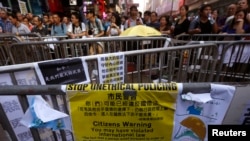In Hong Kong, after days of violent clashes between police and pro-democracy activists, the so-called “Umbrella Movement” enters a potentially pivotal week with the first direct talks with the government on Tuesday. While the hope is that negotiators will find some resolution to the constitutional crisis gripping the semi-autonomous Chinese city, expectations are not high.
Tensions on the streets of Hong Kong have risen in the last few days, with riot police and thousands of democracy activists clashing in Mongkok shopping district.
As the violence escalated, activists faced being crushed as police corralled them against steel barriers. While several officers were injured, the police were widely criticized for beating some young protesters about the head with batons.
Joshua Wong is the leader of Scholarism, one of three groups directing the occupation. He told VOA that, despite the talks being scheduled, activists saw each street as a bargaining chip. And he said they would not readily give them up.
“After the action of the police, activists should try to maintain our the place for Occupy. I am not sure how the direction of the movement will continue. But we will try to persist with our values and try to persist occupying Mongkok, Admiralty and Causeway Bay,” said Wong.
Before Saturday and Sunday's violence, there was already considerable doubt about how effective talks could be. Prof Willy Lam of the Chinese University of Hong Kong added his voice to others Monday, including the convener of Leung’s executive committee, in saying negotiations were unlikely to produce immediate results.
“Most analysts and scholars have a very low expectation of what will happen. It’s quite possible the talks break down. And that more people might join in the Umbrella Movement,” he said.
Those doubts have been exacerbated by the appointment of Cheng Kwok-hon to chair the talks. Cheng, an adviser to chief executive Leung during his election campaign and now president of Lingnan University, reassured the public that any former allegiances would be put aside.
“My role is not to give my own opinions on any of the issues but to facilitate a meaningful discussion and dialogue - a dialogue in which, both sides when they speak, respect the other side and speak within their time limits,” he said.
The Hong Kong Federation of Students will represent the pro-democracy movement at the negotiations, which will be televised live Tuesday night.
The main disagreement remains the activists’ insistence that the public - not a committee of pro-Beijing factions - nominate candidates to stand in the 2017 election for chief executive.
Incumbent Leung again reiterated that, while Beijing was fully aware of public divisions on the issue, such a move was inconsistent with Hong Kong law and a National People’s Congress Standing Committee edict of August 31.
However, he reminded students that a second round of consultations was still pending on the constitutional impasse.
“It is important for students and their supporters to realize … there will be plenty of room to talk about how we can structure a nomination system so we have genuine choice of candidates come 2017,” said Leung.
As the Hong Kong participants in the three-week old dispute move toward the negotiating table, China accuses unspecified foreign entities of influencing events in the city.




